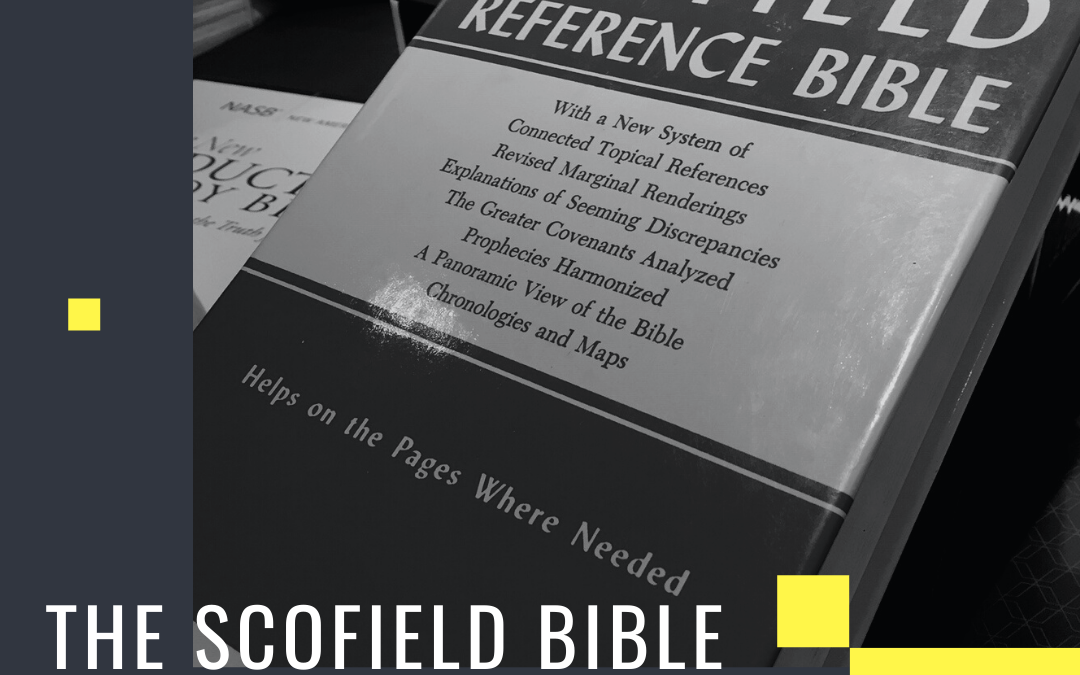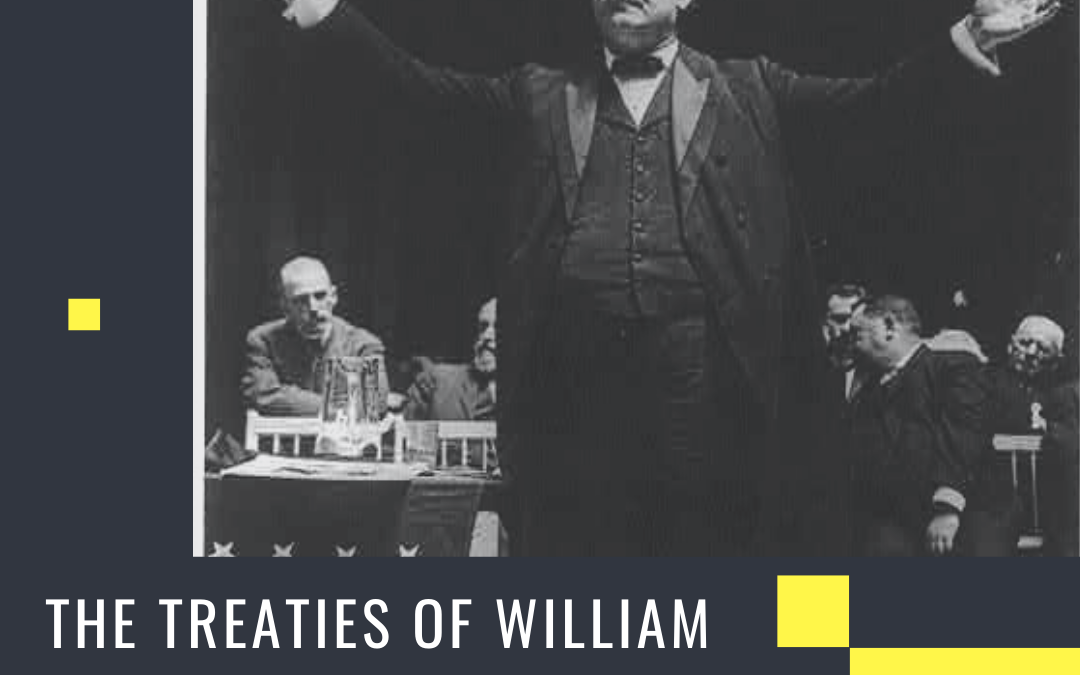
by Chris Staron | Sep 27, 2022 | Episodes
What kind of Bible do you have?
Most of us would answer with the translation we carry. Maybe it’s New Living, the King James, or the New International Version. I’ve heard plenty of conversations about translations in my life. But I’ve never heard a serious discussion about the notes in various Bibles.
Continuing our long exploration of the Christian fundamentalist movement, we explore the Bible version that nudged the United States toward a particular negative theology. One that encouraged people to question the trajectory of history itself. That was one of the purposes of the Scofield Reference Bible, named for its author C.I. Scofield.
The Bible that changed our view of the end
The Scofield Reference Bible emphasizes the premillennial dispensationalist theology we’ve been talking about all season. It expects that world history is sliding into chaos. That was not the primary view in the late 1800s and early 1900s in the US. Most people thought that humanity could improve things until Jesus returned. This Bible is one of the things that changed that.
Special thanks to Nick, Melanie, Hannah, Marc, and Marian for their help with this episode!
Discussion Questions:
- What kind of Bible do you have? Why did you choose it?
- What agenda does your Bible have?
- What audience is it intended for?
- Who wrote your Bible notes?
- Flip to Genesis 1 and Revelation 1. What position does it take on creationism? The end of the world?
- Have you ever considered the origins of your study notes?
How do you feel about us having so many different targeted Bibles?
Select Sources for this Episode:
- The History of the Scofield Reference Bible by Arno C. Gaebelein
- The Evangelicals by Frances Fitgerald
- Fundamentalism and American Culture by George Marsden
- Article on Lyman Stewart who financed this Bible
- A Godly Hero by Michael Kazin
- Isaiah 37
- A Christianity Today article about the changes made to the Scofield Bible (material not used for the episode, but still interesting)
- The Scofield Reference Bible (1945 edition)
- The MacArthur Study Bible
- The Founders Bible
- The Battlefield of the Mind Bible

by Chris Staron | Sep 13, 2022 | Episodes
Can one man end war forever?
William Jennings Bryan.
If we know him at all it is from the Scopes Monkey Trial at the end of his life. Or maybe we know of his 3 failed campaigns for President of the United States on the Democratic ticket. But many of us are unaware of his efforts to establish world peace. William Jennings Bryan hated war. He wasn’t a pacifist – he enlisted for the Spanish-American War after all. But he saw the meaningless carnage of war and vowed to do his best to reduce the amount of bloodshed.
So “The Commoner” used his position as Secretary of State under President Wilson to establish 30 peace treaties. In this mini-episode, we revisit his career and talk about the impact this man might have had if WWI hadn’t slowed his progress.
God-willing I’ll be back soon with a full episode! Thanks for your patience!
Helpful Sources:
- “A Godly Hero” book by Michael Kazin
- “A Righteous Cause” book by Robert Cherny
- “The Evangelicals” by Frances Fitgerald
- “Money: The True Story of a Made Up Thing” by Jacob Goldstein
- “What’s Your Problem?” podcast from Pushkin Industries, hosted by Jacob Goldstein
Discussion Questions:
- William Jennings Bryan was the head of the party of Jim Crow. Do his actions to stop imperialism or war shape how you feel about him?
- Would a conciliation treaty policy work today?
- Is world peace a worthy goal today? What role do weapons play in that?
- How might this tie into fundamentalism?

by Chris Staron | Aug 30, 2022 | Episodes
A socialist bestseller that got everything wrong
Now that we’ve read In His Steps together and discussed it, let’s talk about another work of fiction. Looking Backward was written by Edward Bellamy. That name may sound familiar! We talked about his cousin Frances Bellamy in the episode about the Pledge of Allegiance. Frances was a Christian socialist. Edward wrote his famous book looking forward to the year 2000. He predicted that the United States would be a socialist paradise. People would work hard, retire early, and equality would reign.
None of that came true.
We’re talking about it today in order to understand the zeitgeist in the late 1800s. This book sold over half a million copies in its first few years of publication. It is now over a million copies. That doesn’t happen without stirring something in society. As we’ll see, socialism was tied to the Social Gospel. The opposition to the Social Gospel is what would go on to create the Christian fundamentalist movement.
Helpful Links:
Discussion Questions:
- How have fictional books you’ve read impacted your worldview?
- What do you think about Bellamy’s predictions?
- How does the fear of socialism and communism impact evangelicalism?
- What real threats were facing evangelicalism in the 1800s? How about now?

by Chris Staron | Aug 16, 2022 | Episodes
The Social Gospel downplayed salvation and emphasized good works
Support the Truce Podcast via Patreon or through the website you can do Paypal, check, or Venmo!
We’ve been reading the book “In His Steps” together for the last few weeks. It was written by Charles Sheldon, a man whose book is often associated with the social gospel movement. While some historians struggle over the significance of this work, it’s pretty plain how it fits this movement. The Social Gospel downplayed salvation and emphasized good works. What does your church do? What do you do?
I invited patrons of the show to listen early and then discuss their thoughts on this controversial book.
What did you think about the audiobook? Should I record other books this same way?
Discussion Questions:
- Did you enjoy “In His Steps”? Why or why not?
- How do you think women were portrayed in “In His Steps”?
- What do you think about the Home Economics movement?
- How did you see the social gospel in the book?
- Is the book evangelistic? At which points? If not, why not?
- Does Christian media need to be “heavy-handed”?
Recommended Resources:

by Chris Staron | Aug 2, 2022 | Episodes
In His Steps free audiobook
This is part 3 of an audiobook presented on Truce. Please start at part 1!
Become a patron of the show to keep more content like this coming your way!
In His Steps by Charles Sheldon is a classic of Christian fiction. It is also one of the top-selling Christian books of all time. We’ve been running through the history of Christian fundamentalism this season. It’s worth noting that fundamentalism was a reaction to liberal theology, especially modernism. Another form of liberal theology was the “Social Gospel”. It was a movement led by people like Walter Rauschenbusch that emphasized the socially conscious aspects of Christianity, while simultaneously downplaying evangelism.
Christian fundamentalists did not like the Social Gospel. For one thing, it had a positive view of human progress. It said that the world could get better and better and then Jesus would return. Christian fundamentalists generally think that world history trends downward.
I’m presenting this original audio recording for many reasons. I think this book offers a great window into the era in which it was created (the late 1800s). It also represents the Social Gospel and a slice of the Holiness movement quite well. Finally, I think we need to hear this story in our modern context. Modern Christian churches are divided. What would happen if we dared to ask “What Would Jesus Do?”
Things to track as you listen:
- The role of women in this society
- Wealthy attitudes toward the poor
- The genesis of financial woes in this book is sometimes economic crisis (the late 1800s was full of panics and recessions) and sometimes sin based
- The Holiness movement and those who object to it
- Is this book evangelistic? If so, how is the gospel presented? If not, what does this book leave out?
- The overall positive view of human progress
- Social movements like the pure foods movement, temperance, suffrage, anti-gambling

by Chris Staron | Jul 26, 2022 | Episodes
In His Steps free audiobook
This is the second part of this series. Please go back one episode to begin the complete audiobook
In His Steps by Charles Sheldon is a classic of Christian fiction. It is also one of the top-selling Christian books of all time. We’ve been running through the history of Christian fundamentalism this season. It’s worth noting that fundamentalism was a reaction to liberal theology, especially modernism. Another form of liberal theology was the “Social Gospel”. It was a movement led by people like Walter Rauschenbusch that emphasized the socially conscious aspects of Christianity, while simultaneously downplaying evangelism.
Christian fundamentalists did not like the Social Gospel. For one thing, it had a positive view of human progress. It said that the world could get better and better and then Jesus would return. Christian fundamentalists generally think that world history trends downward.
I’m presenting this original audio recording for many reasons. I think this book offers a great window into the era in which it was created (the late 1800s). It also represents the Social Gospel and a slice of the Holiness movement quite well. Finally, I think we need to hear this story in our modern context. Modern Christian churches are divided. What would happen if we dared to ask “What Would Jesus Do?”
Things to track as you listen:
- The role of women in this society
- Wealthy attitudes toward the poor
- The genesis of financial woes in this book is sometimes economic crisis (the late 1800s was full of panics and recessions) and sometimes sin based
- The Holiness movement and those who object to it
- Is this book evangelistic? If so, how is the gospel presented? If not, what does this book leave out?
- The overall positive view of human progress
- Social movements like the pure foods movement, temperance, suffrage, anti-gambling






